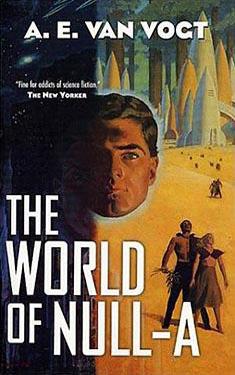AE Van Vogt
Completed 2/27/2016, Reviewed 2/29/2016
1 star
This has to be one of the most complicated novels I’ve ever
read. There’s way too much going
on. The writing is terrible, nothing is
explained well, and the characters are almost as incomprehensible as the
plot. I can’t believe this book was even
nominated for the Retro-Hugos, the awards given for books published before the
Hugo Awards came into being, let alone came in second. The only reason I kept reading it was because
I find it hard to abandon a book, even if it’s mess like this one.
 The Games Machine determines how well you live a
non-Aristotelian, or Null-A, existence, and therefore how successful you will
be in life. The winners of the games get
to emigrate to Venus which has only the best Null-A thinkers. Gilbert Gosseyn is about to play the games,
but finds out he has false memories. He
also has extra bodies, so that if he dies, his consciousness transfers into
another body. In other words, he’s
immortal. Oh yeah, and he has an extra
brain that could make him psychokinetic if he could just figure out how to use
it. And amidst all this, he seems to be
the only person who can stop an intergalactic race of humans from invading
Earth and Venus. Too much? Yeah.
The Games Machine determines how well you live a
non-Aristotelian, or Null-A, existence, and therefore how successful you will
be in life. The winners of the games get
to emigrate to Venus which has only the best Null-A thinkers. Gilbert Gosseyn is about to play the games,
but finds out he has false memories. He
also has extra bodies, so that if he dies, his consciousness transfers into
another body. In other words, he’s
immortal. Oh yeah, and he has an extra
brain that could make him psychokinetic if he could just figure out how to use
it. And amidst all this, he seems to be
the only person who can stop an intergalactic race of humans from invading
Earth and Venus. Too much? Yeah.
The book actually reminded me of “The Forever Machine” aka
“They’d Rather Be Right” which came out a few years later. Not just because of the terrible writing, but
because of the Games Machine. Doing some
research, I found out that van Vogt was involved in the Dianetics movement of L
Ron Hubbard in 1950. This is a few years
after the publication of this novel, but the influence is basically there. Van Vogt was also a believer in General
Semantics, a sort of early version of Neuro Linguistic Programming, the idea
that language affects behavior, another theme that runs through the book. However, it was really hard to follow the
themes because the plot is so scattered.
Perhaps my biggest complaint with the novel was that I
couldn’t follow the other characters.
There was a group of men and one woman who seemed to be sometimes
enemies, sometimes allies. In one scene,
they’re tying Gosseyn up and he has to escape.
Then in the next encounter, they’re talking to him like he’s no
threat. And Gosseyn seemed to like to
tie up Patricia the one female character a lot too. Of course, I hardly even
need to mention the outdated nature of a sole female in the book. It’s one of those things about golden age SF,
that we should feel lucky there even was a woman in the book.
I didn’t mind the outdated science. The computers have tubes and they still think
Venus is habitable. At least phones had
video. I’ve come to expect golden age SF
to be outdated. The technology is not
nearly as important as having a well-executed story with it. “Null-A” just doesn’t have that. Last year I read a collection of van Vogt’s
short stories. They were not brilliant,
but were generally better being smaller and having only one idea.
The plots were too numerous and complex for a single
book. I think if van Vogt was a better
writer, or perhaps if he had a better editor, and some subplots were cut out
and made what remained more robust, this would have been much better. I started the book thinking this might get
two stars, but by the end, I was praying for the end, hoping that it would all
become clear but never happening. Even
the twist at the end wasn’t satisfying. So I decided to go with one star and recommend
staying away from the book unless you’re a hardcore golden age reader.
No comments:
Post a Comment